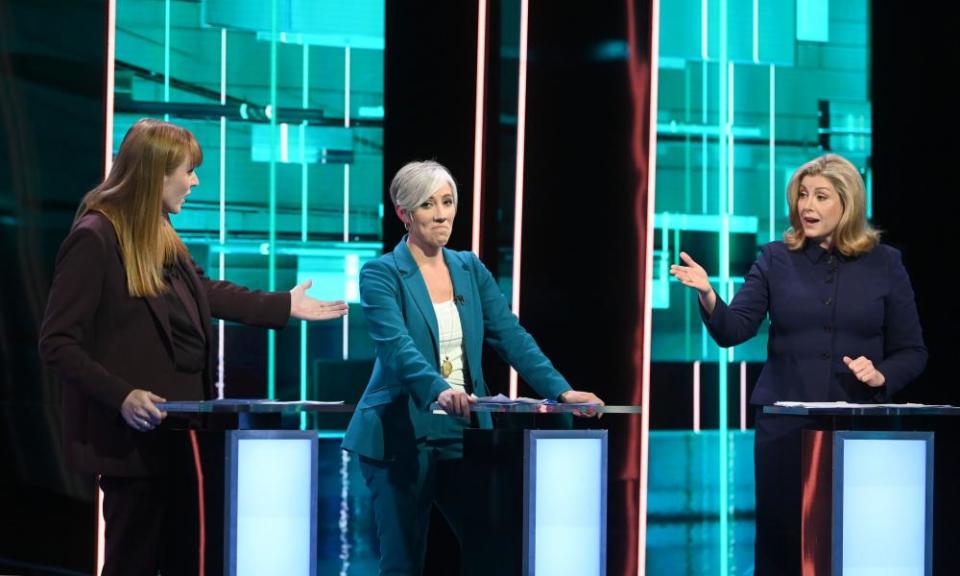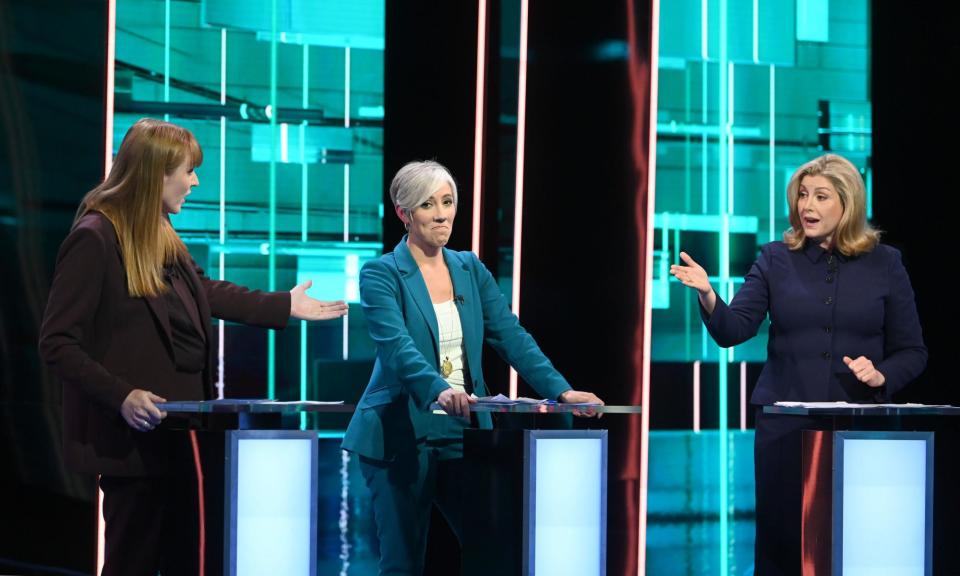Rayner and Mordaunt clash again in heated seven-way TV debate
Angela Rayner and Penny Mordaunt have clashed again in a second seven-way TV debate, one which also featured representatives from smaller parties turning their attacks on Labour as they seem set for government.
Labour’s deputy leader repeatedly had her answers on subjects including public services and the economy interrupted as Mordaunt, the leader of the Commons, accused Labour of wanting to raise taxes, while also saying the party had no economic plans.
“You’ve had 14 years to come up with some ideas,” Mordaunt said at one point. Rayner, prompting laughter from the ITV audience, replied: “You’ve had 14 years in government.”
In an identical lineup to the first seven-way debate on BBC One, the pair debated alongside: Daisy Cooper, deputy leader of the Liberal Democrats; Nigel Farage, the Reform UK leader; Stephen Flynn, the Westminster leader of the Scottish National party; Carla Denyer, co-leader of the Greens; and Rhun ap Iorwerth, the Plaid Cymru leader.
Much like the earlier debate, just under a week ago, the sheer number of participants often made events a bit chaotic, as the panellists talked over each other and jostled for airtime.
But some themes emerged, including a tendency for Labour to take a degree of criticism from a range of parties, while Farage focused his aim on the Conservatives.
An initial question on healthcare and other public services saw Flynn say £18bn of public sector cuts were “baked into a future Labour government”.
He also attacked Labour for planning to use surplus private health provision to try to cut waiting lists, as did ap Iorwerth.
After explaining the Greens’ plans to raise money via wealth taxes and other levies on wealthier people, Denyer asked Rayner why Labour would not do the same. “Why so timid?” she asked the Labour deputy leader.
“I’ve never been called timid in my life,” Rayner replied, to laughter.
Related: Who’s the man behind the manifesto? Meet Labour’s policy director
In a section of the debate in which all seven participants could ask a question of one other panellist, Mordaunt, Denyer, Flynn and ap Iorwerth directed their queries at Rayner.
Farage targeted Mordaunt, as did Cooper – whose party is targeting dozens of Tory seats – and Rayner. The Labour deputy leader asked Mordaunt if she would welcome Farage into the Conservative party, to which she gave a noncommittal answer.
There were repeated exchanges between Mordaunt and Rayner over tax and spending plans, with the Conservative minister repeatedly citing the much-criticised claim that Labour’s spending plans would cost families about £2,000 in extra taxes.
There was, Mordaunt insisted, a fiscal gap in the Labour plans that needed filling.
“The only way they are going to be able to do that is to raise taxes,” she claimed. “They’ve only declared about a quarter of the taxes they are going to put up. They are going to have to put up a lot more.”
Rayner disputed the idea and, at a couple of points when Mordaunt repeatedly tried to raise the subject of tax, some of the audience laughed.
In another slightly awkward moment for the Tory representative, a comment that English schools were “world-class” also prompted laughter.
In another sign of seemingly waning support for the Tories, Flynn won audible audience support by responding to Mordaunt saying people “cannot afford” a Labour government, saying: “What people can’t afford any longer, Penny, is one single day more of a Conservative government which is completely out of touch with reality.”
Farage, for his part, began the debate by citing a new YouGov poll showing Reform UK inching above the Conservatives, saying: “We are now the opposition to Labour.”
He repeatedly sought to bring questions about public services back to immigration, saying: “All of our public services are under pressure because the population has increased by 6 million since the Conservatives came to power. It’s impossible to keep up.”
He also blamed what he termed “an exploding population” for increasing school class sizes. Rayner responded by noting that many school rolls are actually dropping.
Flynn condemned what he called “the Westminster status quo” when a show of hands asked for by the host, Julie Etchingham, resulted in Rayner, Mordaunt, Cooper and Farage agreeing that they wanted migration to fall.
He also said that rather than blaming migrants for making Britons poorer, Farage should take responsibility for damage to the economy caused by his “pet project” of Brexit.

 Yahoo News
Yahoo News 

